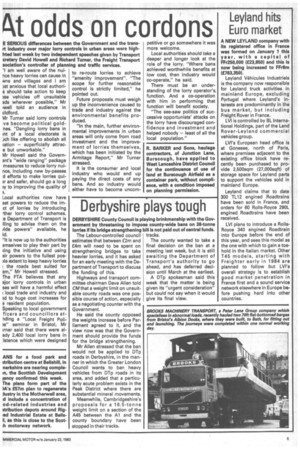k odds on cordons
Page 7

If you've noticed an error in this article please click here to report it so we can fix it.
E SERIOUS differences between the Government and the transrt industry over major lorry controls in urban areas were high. hted last week by two independent speeches given by Transport cretary David Howell and Richard Turner, the Freight Transport sociation's controller of planning and traffic services.
'I am well aware of the nuince heavy lorries can cause in Nns and villages and I am nt anxious that local authoris should take action to keep me vehicles off unsuitable sds wherever possible," Mr well told an audience in iildford.
Mr Turner said lorry controls ve become political goldnes. "Dangling lorry bans in int of a local electorate is ich like offering to abolish all cation — superficially attrace but unworkable."
W Howell said the Governsnt's "wide ranging" package measures to reduce lorry nuince, including new by-passes d efforts to make lorries quiir and safer, should go a long iy to improving the quality of Local authorities now have sat powers to reduce the imct of lorries by introducing ether lorry control schemes.
e Department of Transport is !ling to advise them on the Me powers" available, he id.
"It is now up to the authorities smselves to play their part by cing the initiative and using sir powers to the fullest posile extent to keep heavy lorries
the roads best suited for Bril," Mr Howell stressed. The FTA believes that any ajor lorry controls in urban aas will have a harmful effect local trade and industry and id to huge cost increases for a resident population.
Speaking to local government ficers and councillors atriding a "Local Freight Poliis" seminar in Bristol, Mr imar said that there were alady 2,400 local lorry bans in istence which were designed to re-route lorries to achieve "amenity improvement". "The scope for further reasonable control is strictly limited," he pointed out.
Future proposals must weigh up the inconvenience caused to trade and industry against the environmental benefits produced.
"In the main, further environmental improvements in urban areas will only come from road investment and the improvement of lorries themselves, which has been initiated by the Armitage Report," Mr Turner stressed.
It is the consumer and local industry who would end up paying the direct costs of any bans. And so industry would either have to become uncom petitive or go somewhere it was more welcome.
Local authorities should take a deeper and longer look at the role of the lorry. "Where bans achieved worthwhile benefits at low cost, then industry would co-operate," he said.
There must be an understanding of the lorry operator's, function. And a co-operation with him in performing that function will benefit society.
"The see-saw politics of successive opportunists' attacks on the lorry have discouraged confidence and investment and helped nobody — least of all the local population."
R.. BARKER and Sons, haulage contractors, of Junction Lane, Burscough, have applied to West Lancashire District Council for the continuance of use of land at Burscough Airfield as a container park, without compliance, with a condition imposed on planning permission.




















































































